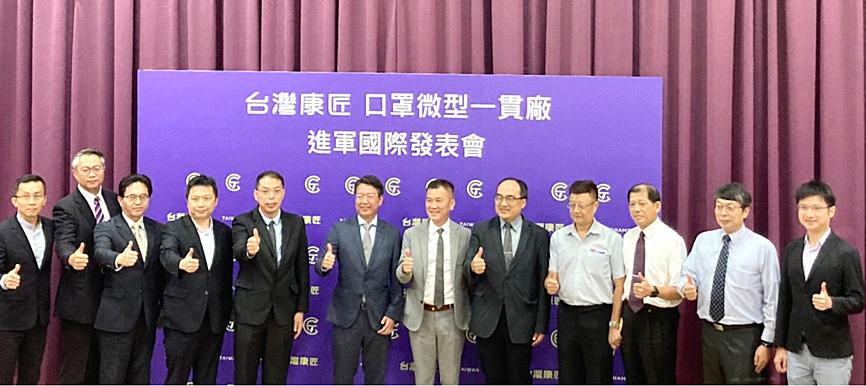Rather than exporting masks, the nation’s leading mask manufacturers plan to export turnkey mask factories as the COVID-19 pandemic continues to affect much of the world.
As a solution to unmet global demand for masks amid the pandemic, Taiwan Comfort Champ Manufacturing Co (台灣康匠) is offering a “total solution” for mask production, including the raw materials, production equipment and testing technology.
“We have miniaturized our mask production line so that it fits in a shipping container. Production can start as soon as you remove the container floor,” Taiwan Comfort Champ chairman Andy Chen (陳勇志) told a news conference in New Taipei City’s Tucheng District (土城) yesterday.

Photo: Chen Jou-chen, Taipei Times
Except for the machines that make and package the masks, the “one-stop mask factory” includes all of the equipment and technical support to produce the critical non-woven layer that serves as the mask’s filtration material, Chen said.
The news conference was organized by the government-backed Taiwan Textile Research Institute (紡織產業綜合研究所).
Each miniature mask factory costs as little as US$5 million and can produce as many as 600,000 masks per day if continuously operated, Taiwan Comfort Champ said.
Higher capacity modules capable of producing up to 2 million masks per day are also available, a company release said.
The mini-factory allows production to rapidly increase and is more environmentally friendly, Chen said.
“Keeping the entire production and packaging process in the same area saves a lot of packaging and transportation costs,” he said.
Despite the unprecedented demand for masks internationally, Taiwan Comfort Champ did not get to cash in on the opportunity because the government set pricing controls, he said.
“We had to drop a lot of foreign orders,” he added.
The company has received inquiries from the US, Canada, Indonesia, Japan and Spain, but investors tend to be hindered by technical hurdles, Taiwan Comfort Champ said, adding that the first turnkey mini factory is to be shipped to Thailand.

In Italy’s storied gold-making hubs, jewelers are reworking their designs to trim gold content as they race to blunt the effect of record prices and appeal to shoppers watching their budgets. Gold prices hit a record high on Thursday, surging near US$5,600 an ounce, more than double a year ago as geopolitical concerns and jitters over trade pushed investors toward the safe-haven asset. The rally is putting undue pressure on small artisans as they face mounting demands from customers, including international brands, to produce cheaper items, from signature pieces to wedding rings, according to interviews with four independent jewelers in Italy’s main

Japanese Prime Minister Sanae Takaichi has talked up the benefits of a weaker yen in a campaign speech, adopting a tone at odds with her finance ministry, which has refused to rule out any options to counter excessive foreign exchange volatility. Takaichi later softened her stance, saying she did not have a preference for the yen’s direction. “People say the weak yen is bad right now, but for export industries, it’s a major opportunity,” Takaichi said on Saturday at a rally for Liberal Democratic Party candidate Daishiro Yamagiwa in Kanagawa Prefecture ahead of a snap election on Sunday. “Whether it’s selling food or

CONCERNS: Tech companies investing in AI businesses that purchase their products have raised questions among investors that they are artificially propping up demand Nvidia Corp chief executive officer Jensen Huang (黃仁勳) on Saturday said that the company would be participating in OpenAI’s latest funding round, describing it as potentially “the largest investment we’ve ever made.” “We will invest a great deal of money,” Huang told reporters while visiting Taipei. “I believe in OpenAI. The work that they do is incredible. They’re one of the most consequential companies of our time.” Huang did not say exactly how much Nvidia might contribute, but described the investment as “huge.” “Let Sam announce how much he’s going to raise — it’s for him to decide,” Huang said, referring to OpenAI

The global server market is expected to grow 12.8 percent annually this year, with artificial intelligence (AI) servers projected to account for 16.5 percent, driven by continued investment in AI infrastructure by major cloud service providers (CSPs), market researcher TrendForce Corp (集邦科技) said yesterday. Global AI server shipments this year are expected to increase 28 percent year-on-year to more than 2.7 million units, driven by sustained demand from CSPs and government sovereign cloud projects, TrendForce analyst Frank Kung (龔明德) told the Taipei Times. Demand for GPU-based AI servers, including Nvidia Corp’s GB and Vera Rubin rack systems, is expected to remain high,